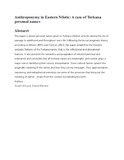| dc.contributor.author | susan, Kinyua | |
| dc.contributor.author | Barasa, David | |
| dc.date.accessioned | 2022-11-16T09:01:02Z | |
| dc.date.available | 2022-11-16T09:01:02Z | |
| dc.date.issued | 2022-07-14 | |
| dc.identifier.uri | https://doi.org/10.58256/rjah.v3i2.843 | |
| dc.identifier.uri | https://royalliteglobal.com/advanced-humanities/article/view/843 | |
| dc.identifier.uri | http://ir-library.mmust.ac.ke:8080/xmlui/handle/123456789/2139 | |
| dc.description.abstract | This paper is about personal names given to Turkana children at birth, during the rite of passage to adulthood and throughout one’s life. Following the lexical pragmatic theory according to Wilson (2003) and Carston (2002), the paper establishes the morpho-syntactic features of the Turkana names, that is, the inflectional and derivational features. It also presents the semantics and pragmatics of selected personal and nicknames and concludes that all Turkana names are meaningful, and context plays a major role in identifying their correct interpretation. Socio-cultural factors govern the pragmatic meaning of the names and how they convey messages. Thus, approximation, narrowing, and metaphorical extension are some of the processes that bring out the meaning of names - drawn from the context surrounding the birth. | en_US |
| dc.language.iso | en | en_US |
| dc.publisher | Reserach Journal in Advanced Humanities | en_US |
| dc.subject | Anthroponymy ,Eastern Nilotic, case, personal, names | en_US |
| dc.title | nthroponymy in Eastern Nilotic: A case of Turkana personal names | en_US |
| dc.type | Article | en_US |

